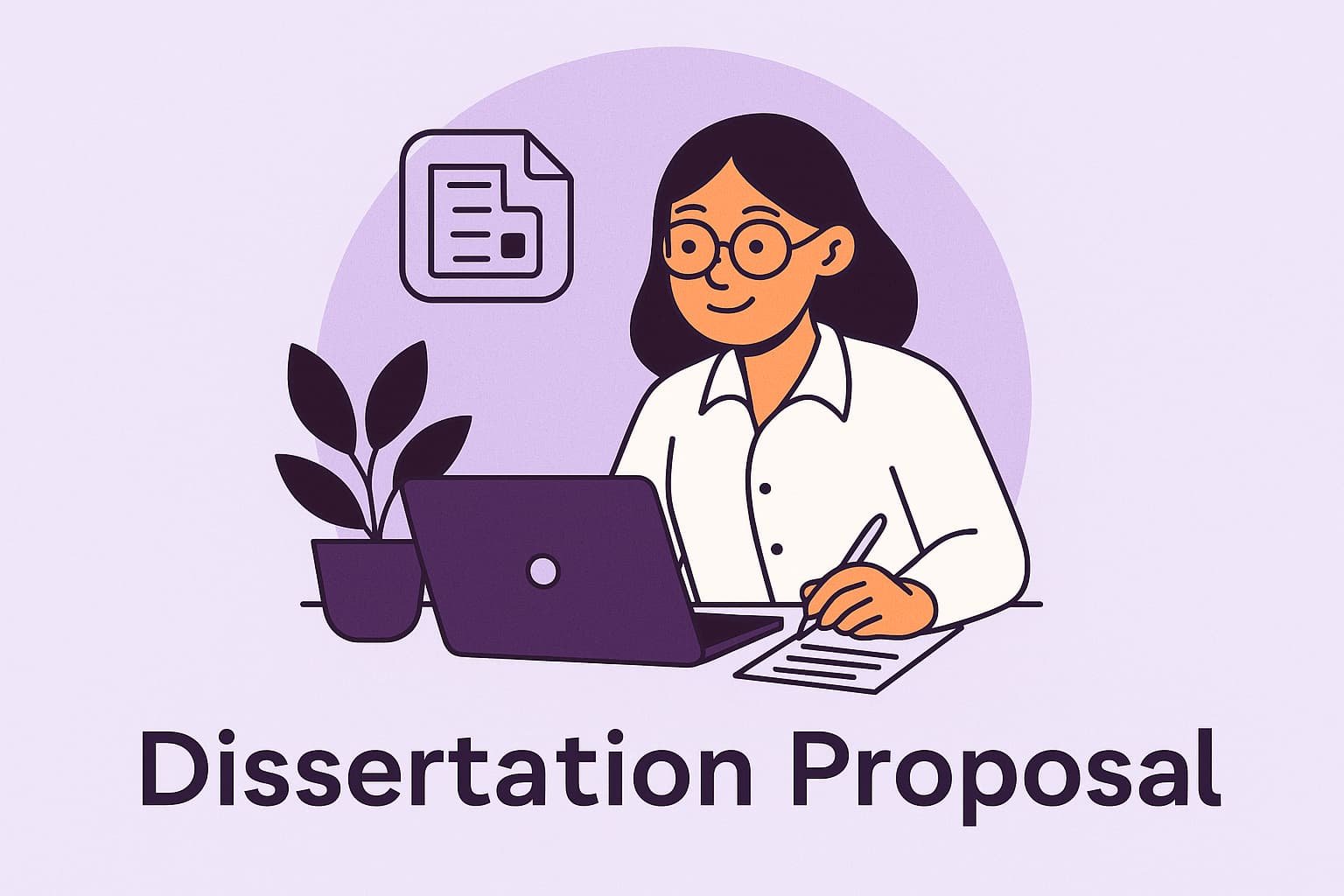📚 How to Write a Dissertation Proposal in the UK That Gets Approved
Writing a dissertation proposal is one of the most critical milestones of your academic journey. At UK universities, it is not just a formality but a key document to demonstrate your readiness and capability to undertake meaningful research.
Yet, many students find the task confusing, stressful, or simply overwhelming. This guide will explain step-by-step how to write a dissertation proposal in the UK that gets approved, with practical examples, common mistakes to avoid, and expert insights.
If you’d rather not tackle it alone, you can always get help from Urgent Assignment Help or explore our specialised Dissertation Help UK service. For urgent assistance, reach us directly on WhatsApp.
Why Does the Dissertation Proposal Matter?
Your dissertation proposal serves several purposes:
- It clarifies your research question and objectives.
- It demonstrates that you understand the existing literature in your field.
- It outlines a feasible methodology.
- It convinces your supervisor that your research is worth pursuing and achievable.
Submitting a strong proposal sets the tone for your dissertation, while a weak one can delay your progress or lead to rejection.
1️⃣ How to Choose the Right Topic
Your topic is the foundation of your entire dissertation. Choosing wisely at this stage saves you months of frustration later.
What makes a good topic?
- Relevant to your course and discipline.
- Original, contributing something meaningful to the field.
- Feasible, considering time, resources, and access to data.
- Interesting, because you’ll live with it for months.
Tips for selecting a topic:
- Review your previous coursework and find recurring themes.
- Browse recent journal articles for gaps or trends.
- Talk to your tutor for suggestions.
- Test your ideas by doing a quick literature search.
If you’re struggling, our experts at Dissertation Help UK can help you refine your topic into a focused research question.
2️⃣ Conduct Preliminary Research
Before you start writing, you need to understand what has already been written about your topic.
Why this step matters:
- Ensures your topic hasn’t already been thoroughly covered.
- Helps you frame your research question in the context of the field.
- Identifies gaps your research could fill.
Use university library databases, Google Scholar, JSTOR, Scopus, and books. Keep detailed notes and start building your reference list as you go. If you feel stuck during this phase, reach out to Urgent Assignment Help for guidance.
3️⃣ Understand the Proposal Structure
Most UK universities require proposals to follow a clear structure. Below is a typical outline.
Title
Your title should be specific and descriptive.
Example:
Exploring the Impact of Remote Work Policies on Employee Productivity in UK SMEs: A Mixed-Methods Study
Introduction
Explain your topic, why it’s significant, and your central research question. Set the context clearly so even non-specialists can understand its relevance.
Literature Review
Summarise and critically analyse key research. Show that you understand the current state of knowledge and identify gaps your work aims to address.
Research Aim & Objectives
Clearly state your aim and break it down into specific, measurable objectives.
Example:
Aim: Investigate how remote work policies affect productivity in UK SMEs.
Objectives:
- Examine employee perceptions of productivity while working remotely.
- Assess how company support influences outcomes.
- Identify barriers and enablers of productivity.
Methodology
Your methodology must demonstrate that your plan is realistic and appropriate. Cover:
- Research design (qualitative, quantitative, mixed).
- Data collection methods (e.g., surveys, interviews).
- Sampling strategy (who, how many, how chosen).
- Data analysis techniques.
- Ethical considerations.
Timeline
Show how you’ll complete the project within the given timeframe, often as a table or Gantt chart.
References
Include a properly formatted list of all cited sources using your department’s required style (Harvard, APA, MLA, etc.).
4️⃣ Writing Tips for a Strong Proposal
Follow these best practices to craft a proposal that stands out:
✅ Be Clear and Concise
Use simple language where possible. Define technical terms.
✅ Stay Focused
Every section should relate directly to your research question.
✅ Demonstrate Feasibility
Be realistic about what you can achieve within your constraints.
✅ Proofread Carefully
Errors undermine credibility. Read aloud and have someone else review your draft.
✅ Seek Feedback Early
Your supervisor, peers, or professionals can provide valuable insights before submission.
5️⃣ Common Mistakes to Avoid
Many students lose marks or face rejections due to these common errors:
🚫 Choosing a topic that’s too broad or too narrow.
🚫 Failing to justify the significance of the study.
🚫 Using outdated or irrelevant literature.
🚫 Proposing an unrealistic or poorly explained methodology.
🚫 Ignoring formatting or guideline requirements.
If you want to avoid these pitfalls, you can always consult the team at Dissertation Help UK.
6️⃣ How Long Should a Dissertation Proposal Be?
Typical lengths vary:
- Undergraduate: 500–1,500 words
- Master’s: 1,500–3,000 words
- PhD: up to 4,000 words
Check your department’s specific guidelines for exact requirements.
7️⃣ Sample Timeline (Master’s Level)
Here’s an example of a realistic schedule:
| Week | Task |
|---|---|
| 1–2 | Select topic and begin preliminary research |
| 3 | Draft introduction and research question |
| 4–5 | Complete detailed literature review |
| 6 | Write methodology section |
| 7 | Finalise aims, objectives, and timeline |
| 8 | Proofread, format, and submit |
Having a clear timeline like this helps prevent last-minute stress.
Frequently Asked Questions
Can I change my topic after submitting the proposal?
Yes, but you’ll need approval from your supervisor and a clear rationale.
Do I need to include data analysis methods?
Yes — even if preliminary. It shows you’ve thought through the process.
Do I need ethical approval?
If your research involves human participants, you’ll likely need to submit an ethics application after your proposal is approved.
Can I get professional help writing my proposal?
Yes — as long as the final work reflects your understanding. Services like Dissertation Help UK can guide you ethically.
How Urgent Assignment Help Can Support You
At Urgent Assignment Help, we specialise in helping students submit winning dissertation proposals. Our Dissertation Help UK service can assist you with:
✔ Topic selection and refinement
✔ Literature review synthesis
✔ Methodology planning
✔ Drafting and editing
✔ Formatting and proofreading
✔ Delivering plagiarism-free, university-compliant proposals
For instant support, message us anytime on WhatsApp.
Final Thoughts
Your dissertation proposal is more than just a requirement — it’s your chance to lay the groundwork for a successful dissertation. By following a clear structure, researching thoroughly, defining realistic aims, and writing with clarity, you can impress your supervisor and avoid unnecessary revisions.
If you need help at any stage — from brainstorming to editing — remember that Urgent Assignment Help and our Dissertation Help UK team are here for you. Reach out anytime on WhatsApp and let us help you achieve academic success.




Thanks for sharing. I read many of your blog posts, cool, your blog is very good. https://accounts.binance.com/si-LK/register-person?ref=LBF8F65G
Your point of view caught my eye and was very interesting. Thanks. I have a question for you. https://accounts.binance.com/bg/register-person?ref=V2H9AFPY